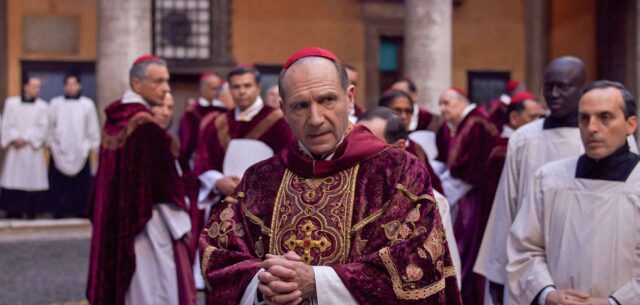It’s a shrewd move to release Conclave, a slick drama about the election of a pope, less than two weeks before the most contentious U.S. election in recent memory. Edward Berger’s tightly wound follow-up to All Quiet on the Western Front is essentially a treatise on voting ethics wrapped in a legal thriller. (Suggested alternate title: 12 Angry Priests.) It’s a timely reminder that spiritual values almost always become entangled with worldly ambition.
For the uninitiated, the papal conclave refers to the gathering of the cardinals of the Catholic Church to appoint the next pontiff by way of a two-thirds majority. (The process was colorfully depicted in the first episode of Paolo Sorrentino’s streaming series The New Pope.) Conclave gives us Ralph Fiennes as Cardinal Lawrence of the Vatican, the de facto dean of the College of Cardinals, whose job is to ensure a fair and smooth election. Troubled by rumors around the unexpected death of the previous pope, Lawrence finds himself caught in a power struggle between warring factions within the conclave. On one side stands liberal Cardinal Bellini (Stanley Tucci) of Italy, who’s totally fine with birth control and gay marriage, and on the other, conservative Cardinal Tedesco (Sergio Castellitto) of Italy, who wants to turn back the clock and Make Catholicism Great Again. Also in the mix are Cardinal Tremblay of Montreal (John Lithgow) and Cardinal Adeyemi of Nigeria (Lucian Msamati), both of whom seem to be hiding something.
Speaking of secrets, the recently deceased pope was apparently harboring a whopper when he died, and the gradual discovery of that secret provides enough intrigue to fuel Conclave for a solid two hours. Berger, whose All Quiet on the Western Front, despite the Oscar nominations, was dinged for aestheticizing the atrocities of WWI, proves himself attentive to the visual possibilities of the story, balancing the solemn weightiness of the drama with an almost anthropological eye for exotic ritual: the locking and sealing of St. Peter’s Basilica from the outside world; the stabbing and burning of ballots after every voting session; the trundling of richly robed cardinals sporting identical white umbrellas. No cutaways to news anchors offering live coverage. No subplots involving laymen and their ordinary problems. Ben Baird deserves special mention for his emphatic sound design, which luxuriates in every unsettling sound one can possibly imagine, from the zip of body bags to the snipping of scissors as they shear through the papal ring. Give this man a horror film.
The cast, as you can imagine, has a blast cosplaying this ostentatious pageant. Fiennes, who can seem equally at home playing a beloved intelligence chief, a Nazi, or Lord Voldemort, sinks easily into his role as the pious, conscience-troubled Lawrence. He gets the lion’s share of screenwriter Peter Straughan’s good lines. Isabella Rossellini is on hand as a wise and wily nun to provide relief from the boys-only club that decides who becomes the most influential Catholic on the planet. Carlos Diehz also has several fine moments as a soft-spoken, almost silent, cardinal whose unheralded arrival seems to upset the balance of power.
If Conclave has all the juicy intrigue of a fat airport novel, that’s because it’s based on one. And while the book doesn’t aspire to the highest planes of literary art, the 2016 Robert Harris bestseller has the benefit of being passionately researched, which lifts it above some of its trashier competitors. The same can be said for Berger’s film, which might be the most serious film about faith and organized religion since Hlynur Pálmason’s Godland and Phạm Thiên Ân’s Inside the Yellow Cocoon Shell. Inevitably, as is usually the case when Hollywood takes up the subject, the physical easily upstages the spiritual. Every theme is spelled out, underlined, preached from the pulpit, and handed down as if from God on high. But instead of being a salve for our own scandal-ridden times, the speechifying eventually becomes an encumbrance, a stumbling block, and yet another flashpoint in our endless culture wars. Most of the blame rests heavily on the twist ending, which reveals the film’s closest-kept secret in a manner akin to the twist in one of Rod Serling’s more famous Twilight Zone episodes, “To Serve Man.” This revelation and its aftermath will not only test the credulity of the audience — it will also split them right down the middle.
Conclave is now screening in theaters.





